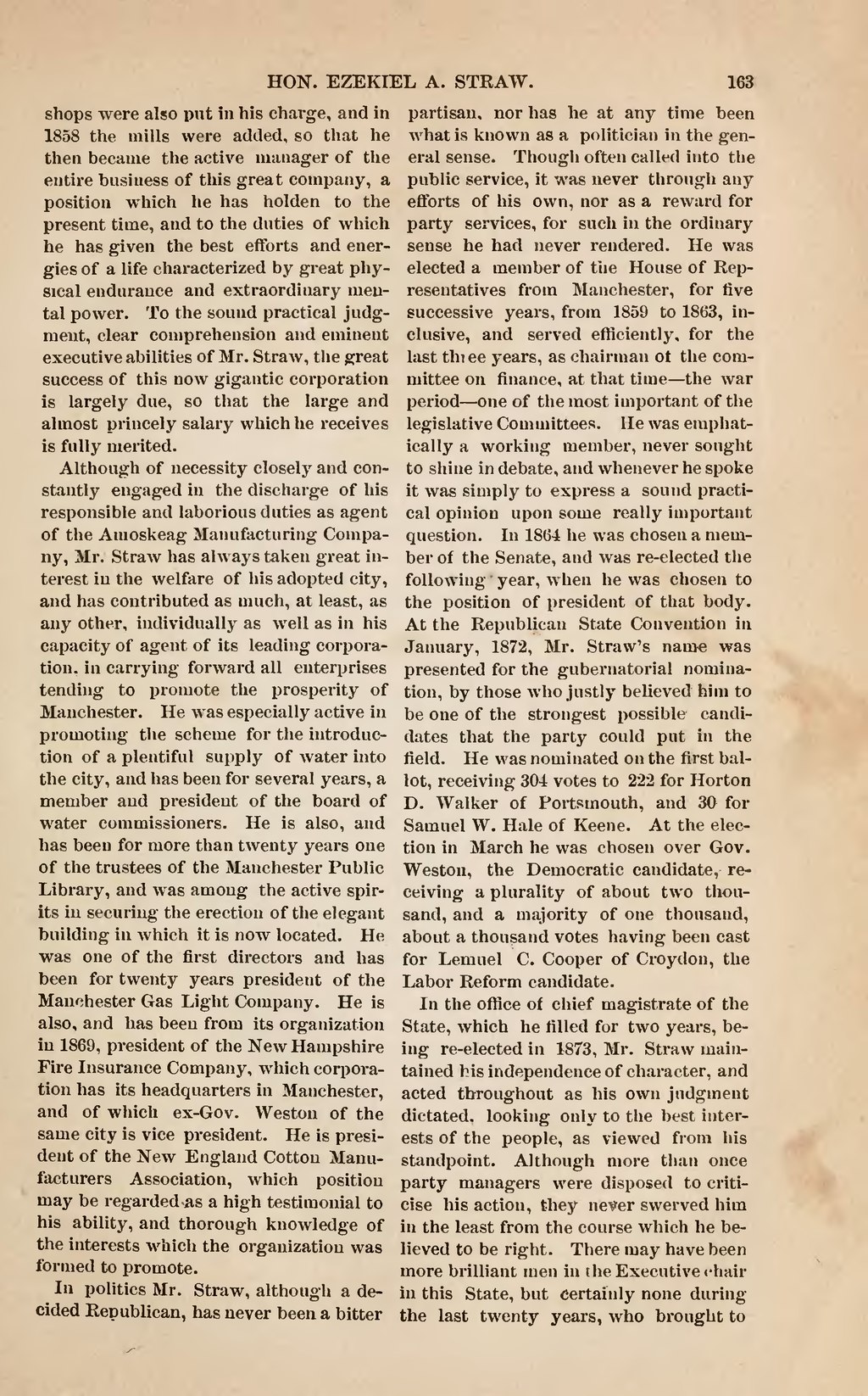HON. EZEKIEL A. STRAW.
��163
��shops were also put in his charge, and in 1858 the mills were added, so that he then became the active manager of the entire business of this great company, a position which he has holden to the present time, and to the duties of which he has given the best efforts and ener- gies of a life characterized by great phy- sical endurance and extraordinary men- tal power. To the sound practical judg- ment, clear comprehension and eminent executive abilities of Mr. Straw, the great success of this now gigantic corporation is largely due, so that the large and almost princely salary which he receives is fully merited.
Although of necessity closely and con- stantly engaged in the discharge of his responsible and laborious duties as agent of the Amoskeag Manufacturing Compa- ny, Mr. Straw has always taken great in- terest in the welfare of his adopted city, and has contributed as much, at least, as any other, individually as well as in his capacity of agent of its leading corpora- tion, in carrying forward all enterprises tending to promote the prosperity of Manchester. He was especially active in promoting the scheme for the introduc- tion of a plentiful supply of water into the city, and has been for several years, a member and president of the board of water commissioners. He is also, and has been for more than twenty years one of the trustees of the Manchester Public Library, and was among the active spir- its in securing the erection of the elegant building in which it is now located. He was one of the first directors and has been for twenty years president of the Manchester Gas Light Company. He is also, and has been from its organization in 1869, president of the New Hampshire Fire Insurance Company, which corpora- tion has its headquarters in Manchester, and of which ex-Go v. Weston of the same city is vice president. He is presi- dent of the New England Cotton Manu- facturers Association, which position may be regarded>as a high testimonial to his ability, and thorough knowledge of the interests which the organization was formed to promote.
In politics Mr. Straw, although a de- cided Republican, has never been a bitter
��partisan, nor has he at any time been what is known as a politician in the gen- eral sense. Though often called into the public service, it was never through any efforts of his own, nor as a reward for party services, for such in the ordinary sense he had never rendered. He was elected a member of the House of Rep- resentatives from Manchester, for five successive years, from 1859 to 1863, in- clusive, and served efficiently, for the last thiee years, as chairman ot the com- mittee on finance, at that time — the war period — one of the most important of the legislative Committees. He was emphat- ically a working member, never sought to shine in debate, and whenever he spoke it was simply to express a sound practi- cal opinion upon some really important question. In 1864 he was chosen a mem- ber of the Senate, and was re-elected the following ' year, when he was chosen to the position of president of that body. At the Republican State Convention in January, 1872, Mr. Straw's name was presented for the gubernatorial nomina- tion, by those who justly believed him to be one of the strongest possible candi- dates that the party could put in the field. He was nominated on the first bal- lot, receiving 304 votes to 222 for Horton D. Walker of Portsmouth, and 30 for Samuel W. Hale of Keene. At the elec- tion in March he was chosen over Gov. Weston, the Democratic candidate, re- ceiving a plurality of about two thou- sand, and a majority of one thousand, about a thousand votes having been cast for Lemuel C. Cooper of Croydon, the Labor Reform candidate.
In the office of chief magistrate of the State, which he filled for two years, be- ing re-elected in 1873, Mr. Straw main- tained his independence of character, and acted throughout as his own judgment dictated, looking only to the best inter- ests of the people, as viewed from his standpoint. Although more than once party managers were disposed to criti- cise his action, they never swerved him in the least from the course which he be- lieved to be right. There may have been more brilliant men in the Executive chair in this State, but Certainly none during the last twenty years, who brought to
�� �
